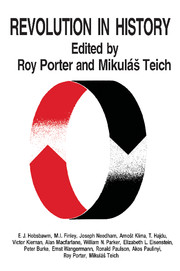Book contents
- Frontmatter
- Contents
- Notes on contributors
- Introduction
- 1 Revolution
- 2 Revolution in antiquity
- 3 Social devolution and revolution: Ta Thung and Thai Phing
- 4 The bourgeois revolution of 1848–9 in Central Europe
- 5 Socialist revolution in Central Europe, 1917–21
- 6 Imperialism and revolution
- 7 Socio-economic revolution in England and the origin of the modern world
- 8 Agrarian and industrial revolutions
- 9 On revolution and the printed word
- 10 Revolution in popular culture
- 11 Revolution in music – music in revolution
- 12 Revolution and the visual arts
- 13 Revolution and technology
- 14 The scientific revolution: a spoke in the wheel?
- 15 The scientific-technical revolution: an historical event in the twentieth century
- Index
8 - Agrarian and industrial revolutions
Published online by Cambridge University Press: 05 February 2015
- Frontmatter
- Contents
- Notes on contributors
- Introduction
- 1 Revolution
- 2 Revolution in antiquity
- 3 Social devolution and revolution: Ta Thung and Thai Phing
- 4 The bourgeois revolution of 1848–9 in Central Europe
- 5 Socialist revolution in Central Europe, 1917–21
- 6 Imperialism and revolution
- 7 Socio-economic revolution in England and the origin of the modern world
- 8 Agrarian and industrial revolutions
- 9 On revolution and the printed word
- 10 Revolution in popular culture
- 11 Revolution in music – music in revolution
- 12 Revolution and the visual arts
- 13 Revolution and technology
- 14 The scientific revolution: a spoke in the wheel?
- 15 The scientific-technical revolution: an historical event in the twentieth century
- Index
Summary
‘Revolution’, as the word is used in economic history, commonly means a thoroughgoing change in production processes and in the social organization of labour, occurring at a faster than customary pace. An agrarian or industrial revolution is an interrelated collection of innovations in technique or in organization (or in both) within these sectors of a society's economic life. Such innovations may appear almost simultaneously or they may spread gradually among a sector's individual productive units – manors, farms, households, workshops – altering their practices, equipment and internal structure. Very frequently the ‘revolution’ breaks units apart and re-forms the individual productive factors in new combinations to allow them to do their work in novel ways which are, by some criterion either of equity or efficiency, more effective.
No a priori argument can be adduced to show that change in one productive unit in a collection of producers requires or implies similar changes in others. Individual manors, farms, workshops, cottages, or commercial associations may experience their own mini-revolutions in form or technique, by changes which come to rest within their own space. On the other hand, such changes may be imitated by other units, and almost necessarily they will change the circumstances or environment in which other units function, rendering dysfunctional or sub-optimal some of their forms or activities. Then, if either competition among units or some maximizing intelligence among them is at work, changes and adjustments will be induced, and these in turn may spread the conditions for, and inducements to, change throughout the agrarian or industrial system.
At this point the question arises whether a thoroughgoing change in one aspect of agriculture or of industry must spread to other aspects of the sector's structure, and from the one sector to the other. Does change in the physical or engineering work done in a sector – i.e. in its technology – imply or require change in the human organization of its activity, in management, control, and the distribution of the product?
- Type
- Chapter
- Information
- Revolution in History , pp. 167 - 185Publisher: Cambridge University PressPrint publication year: 1986



